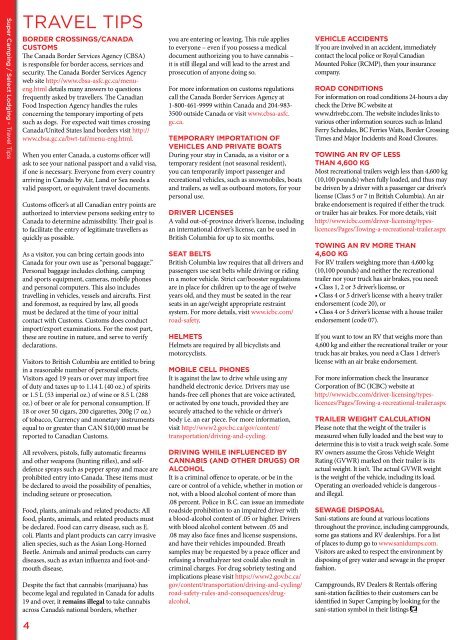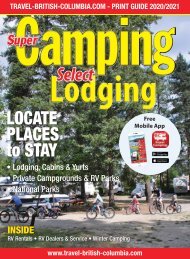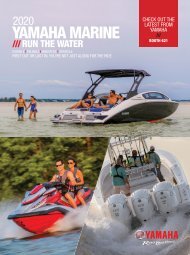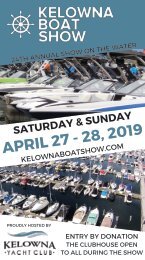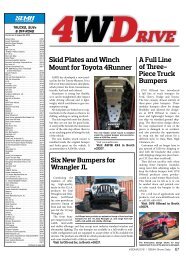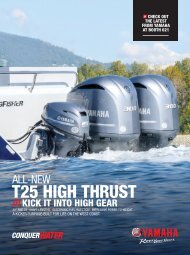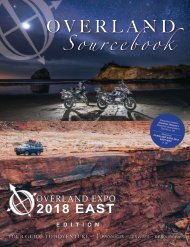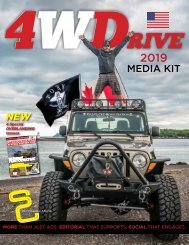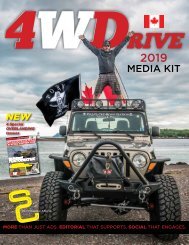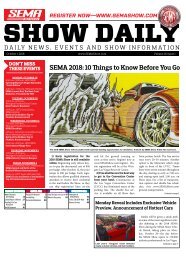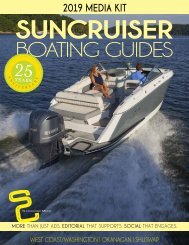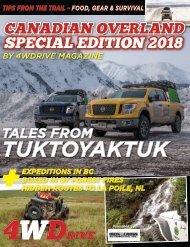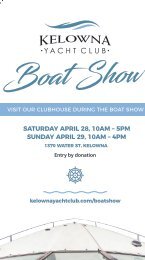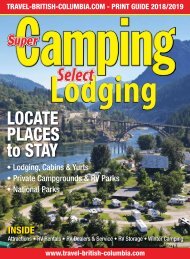2019 Super Camping
Create successful ePaper yourself
Turn your PDF publications into a flip-book with our unique Google optimized e-Paper software.
<strong>Super</strong> <strong>Camping</strong> / Select Lodging - Travel Tips<br />
TRAVEL TIPS<br />
BORDER CROSSINGS/CANADA<br />
CUSTOMS<br />
The Canada Border Services Agency (CBSA)<br />
is responsible for border access, services and<br />
security. The Canada Border Services Agency<br />
web site http://www.cbsa-asfc.gc.ca/menueng.html<br />
details many answers to questions<br />
frequently asked by travellers. The Canadian<br />
Food Inspection Agency handles the rules<br />
concerning the temporary importing of pets<br />
such as dogs. For expected wait times crossing<br />
Canada/United States land borders visit http://<br />
www.cbsa.gc.ca/bwt-taf/menu-eng.html.<br />
When you enter Canada, a customs officer will<br />
ask to see your national passport and a valid visa,<br />
if one is necessary. Everyone from every country<br />
arriving in Canada by Air, Land or Sea needs a<br />
valid passport, or equivalent travel documents.<br />
Customs officer’s at all Canadian entry points are<br />
authorized to interview persons seeking entry to<br />
Canada to determine admissibility. Their goal is<br />
to facilitate the entry of legitimate travellers as<br />
quickly as possible.<br />
As a visitor, you can bring certain goods into<br />
Canada for your own use as “personal baggage.”<br />
Personal baggage includes clothing, camping<br />
and sports equipment, cameras, mobile phones<br />
and personal computers. This also includes<br />
travelling in vehicles, vessels and aircrafts. First<br />
and foremost, as required by law, all goods<br />
must be declared at the time of your initial<br />
contact with Customs. Customs does conduct<br />
import/export examinations. For the most part,<br />
these are routine in nature, and serve to verify<br />
declarations.<br />
Visitors to British Columbia are entitled to bring<br />
in a reasonable number of personal effects.<br />
Visitors aged 19 years or over may import free<br />
of duty and taxes up to 1.14 L (40 oz.) of spirits<br />
or 1.5 L (53 imperial oz.) of wine or 8.5 L (288<br />
oz.) of beer or ale for personal consumption. If<br />
18 or over 50 cigars, 200 cigarettes, 200g (7 oz.)<br />
of tobacco, Currency and monetary instruments<br />
equal to or greater than CAN $10,000 must be<br />
reported to Canadian Customs.<br />
All revolvers, pistols, fully automatic firearms<br />
and other weapons (hunting rifles), and selfdefence<br />
sprays such as pepper spray and mace are<br />
prohibited entry into Canada. These items must<br />
be declared to avoid the possibility of penalties,<br />
including seizure or prosecution.<br />
Food, plants, animals and related products: All<br />
food, plants, animals, and related products must<br />
be declared. Food can carry disease, such as E.<br />
coli. Plants and plant products can carry invasive<br />
alien species, such as the Asian Long-Horned<br />
Beetle. Animals and animal products can carry<br />
diseases, such as avian influenza and foot-andmouth<br />
disease.<br />
Despite the fact that cannabis (marijuana) has<br />
become legal and regulated in Canada for adults<br />
19 and over, it remains illegal to take cannabis<br />
across Canada’s national borders, whether<br />
you are entering or leaving. This rule applies<br />
to everyone – even if you possess a medical<br />
document authorizing you to have cannabis –<br />
it is still illegal and will lead to the arrest and<br />
prosecution of anyone doing so.<br />
For more information on customs regulations<br />
call the Canada Border Services Agency at<br />
1-800-461-9999 within Canada and 204-983-<br />
3500 outside Canada or visit www.cbsa-asfc.<br />
gc.ca.<br />
TEMPORARY IMPORTATION OF<br />
VEHICLES AND PRIVATE BOATS<br />
During your stay in Canada, as a visitor or a<br />
temporary resident (not seasonal resident),<br />
you can temporarily import passenger and<br />
recreational vehicles, such as snowmobiles, boats<br />
and trailers, as well as outboard motors, for your<br />
personal use.<br />
DRIVER LICENSES<br />
A valid out-of-province driver’s license, including<br />
an international driver’s license, can be used in<br />
British Columbia for up to six months.<br />
SEAT BELTS<br />
British Columbia law requires that all drivers and<br />
passengers use seat belts while driving or riding<br />
in a motor vehicle. Strict car/booster regulations<br />
are in place for children up to the age of twelve<br />
years old, and they must be seated in the rear<br />
seats in an age/weight appropriate restraint<br />
system. For more details, visit www.icbc.com/<br />
road-safety.<br />
HELMETS<br />
Helmets are required by all bicyclists and<br />
motorcyclists.<br />
MOBILE CELL PHONES<br />
It is against the law to drive while using any<br />
handheld electronic device. Drivers may use<br />
hands-free cell phones that are voice activated,<br />
or activated by one touch, provided they are<br />
securely attached to the vehicle or driver’s<br />
body i.e. an ear piece. For more information,<br />
visit http://www2.gov.bc.ca/gov/content/<br />
transportation/driving-and-cycling.<br />
DRIVING WHILE INFLUENCED BY<br />
CANNABIS (AND OTHER DRUGS) OR<br />
ALCOHOL<br />
It is a criminal offence to operate, or be in the<br />
care or control of a vehicle, whether in motion or<br />
not, with a blood alcohol content of more than<br />
.08 percent. Police in B.C. can issue an immediate<br />
roadside prohibition to an impaired driver with<br />
a blood-alcohol content of .05 or higher. Drivers<br />
with blood alcohol content between .05 and<br />
.08 may also face fines and license suspensions,<br />
and have their vehicles impounded. Breath<br />
samples may be requested by a peace officer and<br />
refusing a breathalyzer test could also result in<br />
criminal charges. For drug sobriety testing and<br />
implications please visit https://www2.gov.bc.ca/<br />
gov/content/transportation/driving-and-cycling/<br />
road-safety-rules-and-consequences/drugalcohol.<br />
VEHICLE ACCIDENTS<br />
If you are involved in an accident, immediately<br />
contact the local police or Royal Canadian<br />
Mounted Police (RCMP), then your insurance<br />
company.<br />
ROAD CONDITIONS<br />
For information on road conditions 24-hours a day<br />
check the Drive BC website at<br />
www.drivebc.com. The website includes links to<br />
various other information sources such as Inland<br />
Ferry Schedules, BC Ferries Waits, Border Crossing<br />
Times and Major Incidents and Road Closures.<br />
TOWING AN RV OF LESS<br />
THAN 4,600 KG<br />
Most recreational trailers weigh less than 4,600 kg<br />
(10,100 pounds) when fully loaded, and thus may<br />
be driven by a driver with a passenger car driver’s<br />
license (Class 5 or 7 in British Columbia). An air<br />
brake endorsement is required if either the truck<br />
or trailer has air brakes. For more details, visit<br />
http://www.icbc.com/driver-licensing/typeslicences/Pages/Towing-a-recreational-trailer.aspx<br />
TOWING AN RV MORE THAN<br />
4,600 KG<br />
For RV trailers weighing more than 4,600 kg<br />
(10,100 pounds) and neither the recreational<br />
trailer nor your truck has air brakes, you need:<br />
• Class 1, 2 or 3 driver’s license, or<br />
• Class 4 or 5 driver’s license with a heavy trailer<br />
endorsement (code 20), or<br />
• Class 4 or 5 driver’s license with a house trailer<br />
endorsement (code 07).<br />
If you want to tow an RV that weighs more than<br />
4,600 kg and either the recreational trailer or your<br />
truck has air brakes, you need a Class 1 driver’s<br />
license with an air brake endorsement.<br />
For more information check the Insurance<br />
Corporation of BC (ICBC) website at<br />
http://www.icbc.com/driver-licensing/typeslicences/Pages/Towing-a-recreational-trailer.aspx<br />
TRAILER WEIGHT CALCULATION<br />
Please note that the weight of the trailer is<br />
measured when fully loaded and the best way to<br />
determine this is to visit a truck weigh scale. Some<br />
RV owners assume the Gross Vehicle Weight<br />
Rating (GVWR) marked on their trailer is its<br />
actual weight. It isn’t. The actual GVWR weight<br />
is the weight of the vehicle, including its load.<br />
Operating an overloaded vehicle is dangerous -<br />
and illegal.<br />
SEWAGE DISPOSAL<br />
Sani-stations are found at various locations<br />
throughout the province, including campgrounds,<br />
some gas stations and RV dealerships. For a list<br />
of places to dump go to www.sanidumps.com.<br />
Visitors are asked to respect the environment by<br />
disposing of grey water and sewage in the proper<br />
fashion.<br />
Campgrounds, RV Dealers & Rentals offering<br />
sani-station facilities to their customers can be<br />
identified in <strong>Super</strong> <strong>Camping</strong> by looking for the<br />
sani-station symbol in their listings b<br />
4


